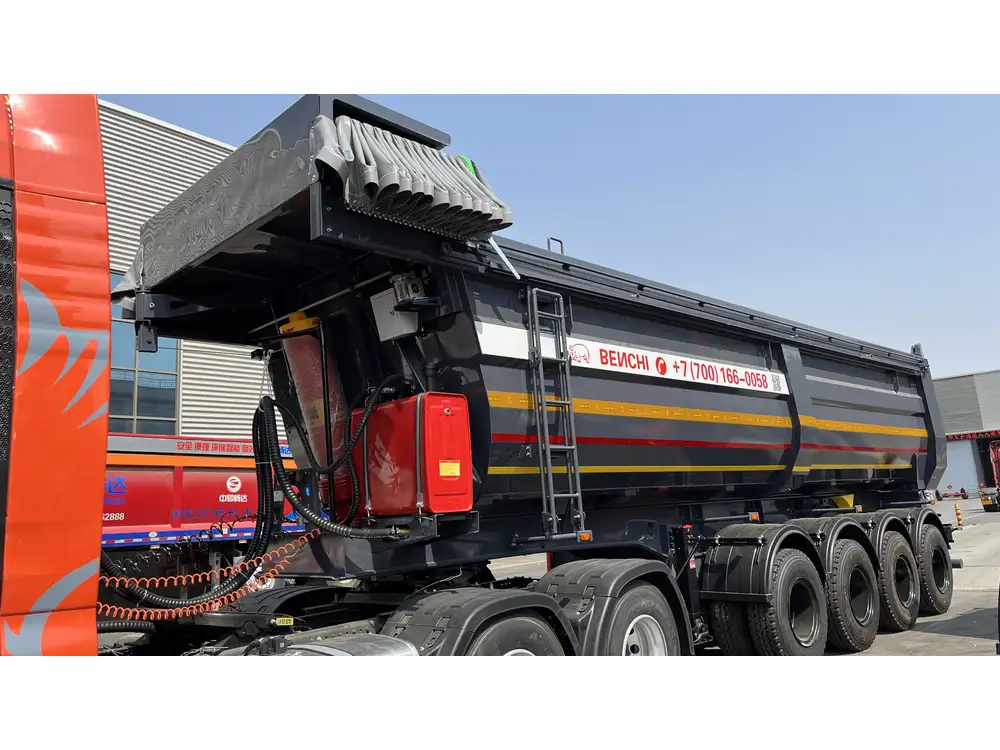In the intricate realm of logistics and transportation, container and chassis trailers play a pivotal role in ensuring the efficient movement of goods across various distances. As manufacturers of semi-trailers, we understand the nuances surrounding these critical components. This article delves deep into the specifics of container and chassis trailers, elucidating their functionality, benefits, and key factors to consider when purchasing or utilizing these freight transport solutions.
Table of Contents
Defining Container and Chassis Trailers
- 1.1 What is a Container Trailer?
- 1.2 What is a Chassis Trailer?
The Interrelationship Between Containers and Chassis Trailers
- 2.1 Compatibility Considerations
- 2.2 Versatility in Transportation
Benefits of Utilizing Container and Chassis Trailers
- 3.1 Enhanced Efficiency
- 3.2 Cost-Effectiveness
- 3.3 Increased Security
Key Factors to Consider Before Purchase
- 4.1 Regulations and Compliance
- 4.2 Trailer Specifications
- 4.3 Maintenance and Durability
Conclusion: Elevating Your Logistics with the Right Equipment
1. Defining Container and Chassis Trailers

1.1 What is a Container Trailer?
A container trailer is designed to carry shipping containers of various sizes, typically 20 or 40 feet long. These trailers are equipped with specific features that facilitate the secure attachment of containers, providing a stable base for transporting goods by road. The structure and design of container trailers ensure they can withstand the significant weight and dynamic forces during transportation, keeping the cargo safe and intact throughout the journey.
1.2 What is a Chassis Trailer?
Chassis trailers, on the other hand, are specifically engineered to support the weight of containers without a fixed container structure. They serve as a platform upon which the container rests. A chassis can be equipped with features like twist locks or protruding posts that firmly secure the container in place, making them indispensable in load transfer between sea and land transport modes.
2. The Interrelationship Between Containers and Chassis Trailers

2.1 Compatibility Considerations
When considering the use of container and chassis trailers, compatibility is paramount. Not all containers fit every chassis, which can lead to complications during loading or transit. It is essential to verify the dimensions and weight specifications of containers and ensure the chassis trailer can adequately accommodate them.
| Container Type | Standard Length | Maximum Gross Weight | Required Chassis Type |
|---|---|---|---|
| 20 ft | 20′ | 24,000 lbs | 20 ft Chassis |
| 40 ft | 40′ | 48,000 lbs | 40 ft Chassis |
| High Cube | 40′ | 48,000 lbs | 40 ft Chassis |
2.2 Versatility in Transportation
Container and chassis trailers are lauded for their versatility. They are instrumental in maritime shipping as well as intermodal transport, allowing for seamless transitions between sea, rail, and road. This adaptability is a substantial advantage for logistics companies that require efficient supply chain solutions, enabling them to cater to a diverse range of goods and cargo types.
3. Benefits of Utilizing Container and Chassis Trailers

3.1 Enhanced Efficiency
The streamlined design of container and chassis trailers contributes significantly to efficiency. By enabling quick loading and unloading processes, goods can be transported with minimal delay. Swift transitions facilitate just-in-time delivery, an essential aspect for businesses striving to meet rapid consumer demands.
3.2 Cost-Effectiveness
Investing in container and chassis trailers can yield substantial cost savings in the long run. Their durability reduces replacement costs, and the efficiency of transporting cargo can lower fuel expenditure. Furthermore, the use of these trailers reduces downtime, enhancing overall productivity and revenue generation.
3.3 Increased Security
Container trailers provide a heightened level of security for transported goods. The nature of containerization inherently protects against theft and weather-related damage. Furthermore, integrating modern locking mechanisms and GPS tracking systems can enhance security further, guaranteeing that high-value shipments remain safeguarded throughout their journey.

4. Key Factors to Consider Before Purchase
4.1 Regulations and Compliance
Before procuring container and chassis trailers, it is crucial to remain informed about national and international regulations governing transportation. Compliance with the International Maritime Organization (IMO) standards, U.S. Department of Transportation (DOT) regulations, and various local transport laws is fundamental. Failure to adhere to these guidelines can result in significant legal ramifications and financial penalties.
4.2 Trailer Specifications
Evaluating trailer specifications is indispensable when making a purchasing decision. Key specifications include:
- Weight Capacity: The maximum weight a trailer can bear.
- Material Composition: The durability and longevity of the trailer largely depend on its materials, usually aluminum or steel frameworks.
- Axle Configuration: Single or tandem axle configurations affect maneuverability and load distribution.
| Specification | Details |
|---|---|
| Weight Capacity | Determine maximum load per trailer |
| Dimensions | Match with container specifications |
| Material | Choose between aluminum or steel for durability |
| Axle Configuration | Consider the benefits of single vs. tandem axles |

4.3 Maintenance and Durability
Regular maintenance plays a critical role in the lifespan of both container and chassis trailers. Prospective buyers must consider the ease of maintenance associated with their choice. Components such as brakes, tires, and suspension systems should be regularly inspected and maintained. Understanding the durability of materials used in trailer construction also influences long-term costs and operational efficiency.
5. Conclusion: Elevating Your Logistics with the Right Equipment
In conclusion, container and chassis trailers are integral components of effective logistics management. Their efficiency, cost-effectiveness, and security features make them indispensable for industries that rely on road transport for their freight needs. By understanding the intricacies associated with these trailers—from compatibility and specifications to regulatory compliance—logistics companies can make informed decisions that enhance their operational productivity and customer satisfaction.
In selecting the right container and chassis trailers, businesses not only optimize their transport capabilities but also position themselves for growth in an increasingly competitive marketplace. Adequate knowledge and strategic investment in these trailers will ensure that companies are well-prepared to navigate the complexities of global logistics effectively. Embrace the opportunity to revolutionize your supply chain with our meticulously crafted semi-trailer solutions, tailored to meet the unique demands of your business landscape.



